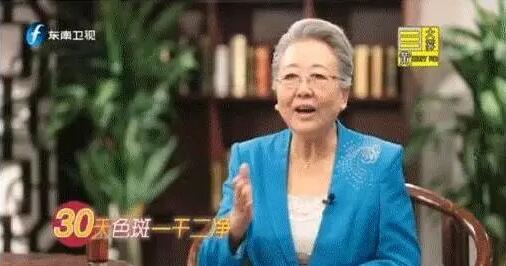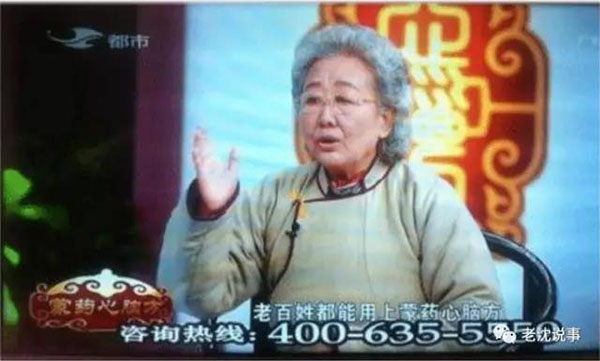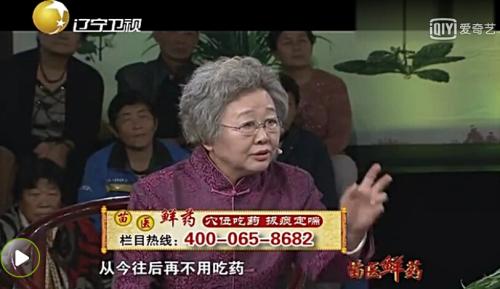


A self-proclaimed professor of medicine has captured public attention in China after her multiple identities, which she used to sell medical supplies on TV, were uncovered and proved fake.
The fraudster, reportedly named Liu Hongbin, has been selling various medical products on TV in China since 2014. Liu would change her identity based on the product she was selling. As of press time, nine of her fake identities had been exposed, including medical professor at Peking University, practitioner of Chinese traditional Miao and Meng medicine and vice director of the Chinese Medicine Committee, an organization that does not even exist.

Liu’s deceitful tricks and convincing performances yielded her huge profits. According to Liu, her medical products are secret recipes, recipes handed down from ancestors or elixirs that can offer a radical cure for chronic diseases including diabetes and rheumatic disorders.
The scammer’s multiple identities and grandiloquent remarks have drawn attention from both the public and the government. According to Beijing Youth Daily, the Beijing Municipal Commission of Health and Family Planning confirmed on June 21 that Liu is not a licensed pharmacist in Beijing, while several of Liu’s medical products have already been banned by local governments due to concerns over safety and efficacy. For instance, a capsule that Liu promoted turned out to contain Sudan Red G, a forbidden food dye in China that is considered toxic and carcinogenic.

The scandal has upset many netizens. Under the hashtag “ExpertLiuHongbin,” which had garnered over 4.5 million page views as of press time, Liu is being ridiculed by internet users as a “veteran actress,” with many demanding a thorough investigation into her real identity.
“I cannot believe that the authorities would allow such a fraudster to scam people nationwide without being punished. This shows the government’s lax attitude toward the management of fake medical information,” one netizen wrote.
According to a regulation on medical ads and promotion released by State Administration of Press, Publication, Radio, Film and Television in 2016, medical TV programs are forbidden from selling or promoting medical products or services. Invited guests on the shows must possess licenses approved by the government. However, in practice, many televised shopping platforms have been violating or even ignoring these rules outright, jeopardizing the healthy development of China’s TV shopping industry.
In 2016, annual sales of China’s televised shopping platforms dropped 8 percent from their 2015 levels, for total sales of 36.6 billion RMB. Many believe fake ads and fraudulent information were primary causes of the drop.
Other netizens have exposed three other self-identified medical experts who sell fake medical products on TV, calling them, along with Liu, China’s “Top Four Medical Miracles.”
 Fire brigade in Shanghai holds group wedding
Fire brigade in Shanghai holds group wedding Tourists enjoy ice sculptures in Datan Town, north China
Tourists enjoy ice sculptures in Datan Town, north China Sunset scenery of Dayan Pagoda in Xi'an
Sunset scenery of Dayan Pagoda in Xi'an Tourists have fun at scenic spot in Nanlong Town, NW China
Tourists have fun at scenic spot in Nanlong Town, NW China Harbin attracts tourists by making best use of ice in winter
Harbin attracts tourists by making best use of ice in winter In pics: FIS Alpine Ski Women's World Cup Slalom
In pics: FIS Alpine Ski Women's World Cup Slalom Black-necked cranes rest at reservoir in Lhunzhub County, Lhasa
Black-necked cranes rest at reservoir in Lhunzhub County, Lhasa China's FAST telescope will be available to foreign scientists in April
China's FAST telescope will be available to foreign scientists in April "She power" plays indispensable role in poverty alleviation
"She power" plays indispensable role in poverty alleviation Top 10 world news events of People's Daily in 2020
Top 10 world news events of People's Daily in 2020 Top 10 China news events of People's Daily in 2020
Top 10 China news events of People's Daily in 2020 Top 10 media buzzwords of 2020
Top 10 media buzzwords of 2020 Year-ender:10 major tourism stories of 2020
Year-ender:10 major tourism stories of 2020 No interference in Venezuelan issues
No interference in Venezuelan issues
 Biz prepares for trade spat
Biz prepares for trade spat
 Broadcasting Continent
Broadcasting Continent Australia wins Chinese CEOs as US loses
Australia wins Chinese CEOs as US loses